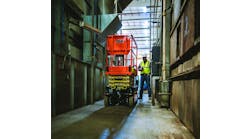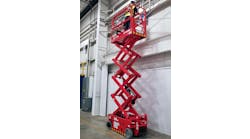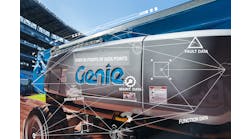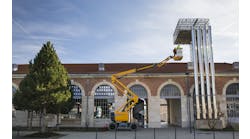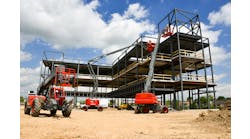Participants:
Roddy Yates, generator product manager, Baldor Electric Co., Fort Smith, Ark.
Pam Meyer, equipment sales manager, Subaru Robin America, Wood Dale, Ill.
John Michael Paz, president, Godwin Pumps, Bridgeport, N.J.
David Spears, product manager of power products, Genie Industries, Redmond, Wash.
Rock Reed, assistant vice president, Honda Power Equipment, Alpharetta, Ga.
Chuck Westhofen, product marketing manager for Atlas Copco, Rock Hill, S.C.
RER: How has the state of the economy affected your company?
Yates: Overall industrial consumption has decreased. There are still opportunities in areas where energy efficiency, security and process uptimes are a concern.
Meyer: Like all manufactures today we have all been affected by the economy in one way or another. However, we must continue to move forward. This year Subaru has introduced a new generation of our RGX Series generators as well as many new engines to our lineup. We have to stay sharp and stay up on the technology. This will ensure we are ready for when the economy starts to pick up.
Paz: It has affected our company. Although we are about 18-percent behind year-to-date, we are fortunate to provide rental, sales and service. Therefore, we are spread evenly across sectors that tend to balance each other out in a bad economy. Our rentals are down a little bit, as are our sales. Our service is actually up a little bit, which you might expect. Typically, equipment owners are more apt to repair equipment when they are forced to pinch pennies, as opposed to replacing it. We are fortunate to be able to provide that option to customers and to ourselves.
Spears: Along with the construction equipment industry as a whole, Terex has felt the ramifications of the economic downturn and credit crunch.
Reed: Like most companies, Honda Power Equipment has felt the effects of the recent shifts in the global economic situation. Specifically, severe changes in the housing market have directly affected the power product business, yet we still foresee a demand for durable, reliable and fuel-efficient products that help our customers get things done.
Westhofen: While the state of the economy is getting a bad name this year, incremental improvements are happening every month. February was better than January and March is looking better than February. Atlas Copco is in a quieter time at the moment because it is working hard to meet the emission requirements in all of its machines. Engines are at Tier 3 now, with some models going to Interim Tier 4.
Describe the current conditions of the generator market?
Yates: Construction and rental sales are off as operators sell older and excess inventory without replacement with new. Longer term construction and municipal projects are still viable for generator sales along with stationary applications that satisfy operational efficiencies or security concerns.
Meyer: The portable generator market is down. We have had some help this winter with the ice storms in New England and Kentucky. However, now that spring has begun, many dealers have noticed sales starting to pick up.
Paz: As we enter into the spring flooding season and the hurricane season in the summer, we anticipate that the demand for generators will increase as it has in past years when there is a hurricane. We are maintaining inventory in our rental fleet and sales inventory in anticipation of these occurrences.
Spears: The current economic conditions are affecting the generator market. However, it has not declined as much as some equipment segments.
Reed: Currently, the generator market appears to be somewhat stable, as consumer demand for portable and backup power remains steady.
How have your clients' requests changed in their generator requirements in regard to the economy?
Yates: Customers are placing more interest on cost versus benefit of features, rather than features for the purpose of exclusion of manufacturers.
Meyer: The customers are being much more cautious with their purchasing this year. We definitely saw this at the ARA show. They are buying only what they need. They are also looking at purchasing equipment that will be the best for their return on investment. They want to make every dollar count.
Paz: Our clients have not changed their requests.
Spears: As the overall construction industry slowed, rental companies became hesitant with their new equipment purchase plans. Our generator line is and will continue to be evaluated to meet customers' needs and our long-term goals.
Reed: Although we have not experienced drastic swings in generator demand, it does appear that end users are very carefully considering their generator purchases and rentals more than ever. Product reliability, fuel efficiency and cost of operation are strong purchase or renting considerations for consumers today.
Westhofen: As well as emissions-led changes, Atlas Copco is focusing on customer-led changes to make our generators the best they can be. Customers are looking to save money as well as have a safe and efficient machine. Atlas Copco has put safety and the environment in high regard with built-in safety features; a containment frame that allows no spillage onto the ground; fewer servicing needs with a 500-hour service interval; and easy-to-use machines that give users little concern.
What has your company been doing to reduce costs in terms of manufacturing generators?
Yates: Closely monitoring operational processes and work flow to identify and correct areas of inefficiencies and lost productivity. Working closer with vendors to increase volumes, product consistency, and increase inventory turns.
Meyer: We continue to be smart with the procurement of raw goods and components. Manufacturing is constantly working to improve processes, thereby reducing production costs.
Paz: We have been very active in this area in reducing the cost of components used in our manufacturing. Specifically, we have recently expanded our facility to accommodate economies of scale.
Spears: Terex is continuously working to manage expenditures and improve our products. Input costs remain a challenge we are addressing.
Reed: From a manufacturing standpoint, Honda has always worked hard to maintain very high levels of efficiency within all of our varied product manufacturing facilities. We incorporate a flexible manufacturing system at all of our facilities that allows us to change production levels and products quickly and efficiently. In this way, we strive to keep our factories producing product in conjunction with consumer demand.
Westhofen: In terms of cost savings on the manufacturing end, we changed from having two fuel tanks on our generators that provide 24-hour service to one tank, which still provides 24-hour service. There is less sheet metal being used to build the fuel tanks and also less time on the production end. Atlas Copco has also started purchasing more components in the United States, helping to provide more local jobs as well as save on shipping costs from Europe.
With costs on the rise from every front, why should rental companies add more generators to their fleet?
Yates: Preparation is the key to success. Adding more efficient equipment that requires less maintenance can free up effort that would be better invested on customer relations and satisfaction.
Meyer: In this economy, every sale counts. The rental centers need to make sure they have an adequate supply of generators in stock to meet their customer's requirements. The last thing they need is to lose sales or rentals because they don't have the right generator or enough generators in their fleet.
Paz: At this particular time, I'm not so sure that they should. Utilization is mediocre, at-best, with the exception being anticipation of weather-related crises, such as hurricanes and floods. For example, 2008 witnessed the largest combined catastrophic losses recorded for the insurance industry in a single year in the history of the United States, with the greatest contributing factor being thunderstorms. While our pumping sector of the business has increased as a result of this phenomenon, we are certain that the generator portion of our business can also improve.
Spears: Generators are versatile pieces of equipment for rental customers and can be utilized across a wide range of jobs. Many generator needs, including temporary power for unexpected power outages, are necessary regardless of the state of the economy at the moment. With generators frequently being used in critical power situations, it is important that a rental fleet be up to date. Allowing the average fleet age to increase may have a much higher cost down the road as opposed to well considered investment in new generators.
Reed: Portable generators continue to be popular with homeowners, recreation enthusiasts and for industrial applications. Consumers continue to look for ways to power their work and play, and generators provide an excellent solution to meet both needs. In today's economic climate, some consumers have opted to rent equipment such as generators instead of purchasing, therefore leading them to seek a trusted product via a rental company.
Westhofen: Uninterrupted power is crucial now more than ever. A company cannot be without power and survive. There is just too much need for power to be without it for even an hour. Having backup rental generators available is more important now than ever. Rental companies can also take advantage of the increased utilization of machines for bridgework and roadwork being performed as stimulus funds are released. Contractors and rental companies should not be passive recipients of funds. Go out and chase business. Have a fleet and be ready to go.
